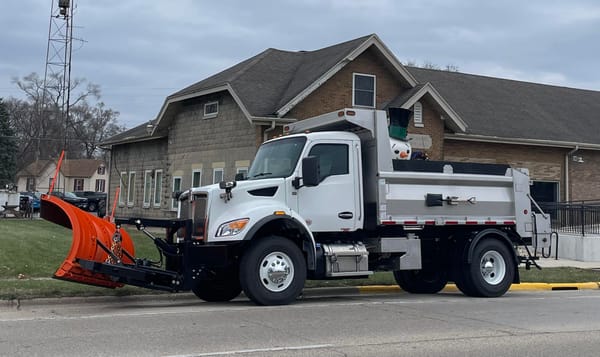Chemtool hasn't released list of materials, says fire reduced everything to its elemental form
Lubrizol admits contaminants released from the fire include sulphur and zinc.

More than a month after the Chemtool explosion and fire, the company has not provided a list of the raw materials that were at their site. Residents want to know what chemicals they have been exposed to. Several groups have been asking for the list, including the Village of Rockton and the Citizens for Chemtool Accountability Group.
Chemtool's parent company Lubrizol seems to have that inventory of chemicals, even if they're not releasing it. When Roscoe News asked about it, Alicia Gauer, a company spokesperson, replied, "Lubrizol health and safety experts have completed a thorough analysis of raw materials and products at the site during the incident."
For continuing coverage, subscribe to Roscoe News -free local news updates by email each day.
For dramatic aerial photos of the fire, visit https://www.facebook.com/SMcCorklePhoto/
Why hasn't Lubrizol released the list? They imply that it isn't relevant. Their reasoning: "During a fire of this magnitude, products will convert to their elemental form. This infographic details the mix of the elements from Chemtool’s impacted materials (carbon, hydrogen, oxygen and nitrogen, as examples), [90% of] which are elements we breathe and touch every day."
The company says less than 10% "of the elements are commonly found in products we use regularly, including personal care items, food, vitamins and sunscreen." It gives the examples of "Calcium, Phosphorous, Sulfur and Zinc." However, some of those elements can cause health problems, and air and water tests have found more complex contaminants, not only the elemental forms.
In the case of zinc, which in small amounts is a necessary nutrient, the Illinois Department of Public Health says, "Eating large amounts of zinc for longer periods may cause anemia, nervous system disorders, damage to the pancreas and lowered levels of 'good' cholesterol." Tests by the Illinois EPA of the Rockton sanitary sewer system suggest that Rockton had too much zinc even before the fire.
Some air quality tests in the area during the fire showed elevated levels of hydrogen cyanide and hydrogen sulfide, both of which are dangerous in large quantities. As we reported, hydrogen cyanide causes sickness and death, but only at levels about 15 times higher than anything measured in Rockton. Hydrogen sulfide (a component of "swamp gas") smells like rotten eggs and has both natural and industrial sources. On June 20, according to tests by the Illinois EPA, concentrations reached 0.8 parts per million in Rockton. OSHA says some people could smell that, and that at five times that level, symptoms may include "nausea, tearing of the eyes, headaches or loss of sleep," with worse symptoms for asthmatic patients.
Several lawsuits have been filed against Chemtool/Lubrizol, including ones from the State of Illinois, Collins Law Firm, Meyers-Flowers and possibly Edelson (they were advertising on Google). Those attorneys are asking for an inventory too. Based on the Attorney General filing and the IEMA Tier II reported chemical list, the Citizens for Chemtool Accountability group has made a guess of the inventory:
- Crude oil - 4 million gallons
- Zinc - 10,000-25,000 pounds (average daily amount)
- Sulfuric Acid - 1000-5000 pounds
- Nitrogen - 1000-5000 pounds
- Lead - 10,000-25,000 pounds
- Ethylene Glycol - 10,000-25,000 pounds
- Diphenylmethane Diisocyanate - under 100 pounds
- Lithium ???
- Mineral oil ???
- Other chemicals ???
At the July 13 news conference, Dr. Sandra Martell, Public Health Administrator at the Winnebago County Health Department, said that anyone with symptoms should see a doctor. But when asked which chemicals the doctor should test for, Dr. Martell said, "there are no specific tests... the symptoms should drive the test."
Maybe residents shouldn't worry. The Illinois EPA say that test levels are mostly normal, or at least, as normal as they were before the fire. They have posted air and water test results on their website. Severson Dells biologist Jillian Neese has provided a simplified explanation of the test results, including the results that exceeded safe levels.
In Rouen, the French city that went through a similar fire at a Lubrizol plant two years ago, several community groups have sprung up in response, including Rouen Respire. Some Rouen residents shared their experiences with the Rockton community group over Zoom and Facebook Live on July 10.
Pierre-Emmanuel Brunet, president of Rouen Respire, said they experienced a "lack of information, lack of transparency... we didn't know what we were breathing, we didn't know what was in the air."
When told of Rockton's experiences, Robin Letellier of Rouen said, "It was the same in France. The Ministry of Health promises to give us the inventory. But the technical data were and are still incomplete. After two years we still don't know what kinds of products were burnt in Rouen 'coz Lubrizol doesn't want to give us the full compositions of the products."
Michel Chadelaud, a retired occupational health doctor who worked for more than 30 years with French factories, said, "Communication is very very very difficult... to get reliable facts, reliable analysis."
Lubrizol spokesperson Alicia Gauer is aware of how the residents of Rouen feel, but disagrees that Lubrizol failed them. She told Roscoe News, "In both regions, we remain committed to the community. As we are in Rockton, in Rouen we quickly mobilized a reimbursement claims process, supported testing and worked with local authorities. We will continue to support the needs of both communities."
Gauer told Roscoe News, "You are correct that the site sits on a Superfund site, designated as such before our purchase of the company. We will be investigating the impact of the fire on the site in the near future." Congress set up the Superfund program to handle long-term cleanup for hazardous waste sites. In the case of Rockton, the EPA began managing cleanup after the Beloit Corporation declared bankruptcy in 2000.





